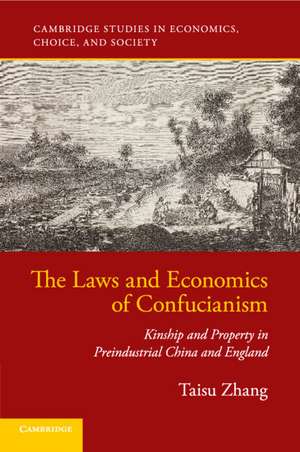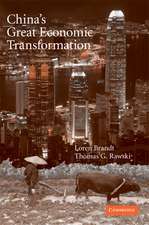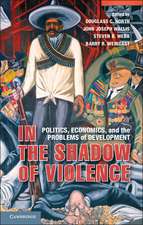The Laws and Economics of Confucianism: Kinship and Property in Preindustrial China and England: Cambridge Studies in Economics, Choice, and Society
Autor Taisu Zhangen Limba Engleză Paperback – 15 mai 2019
| Toate formatele și edițiile | Preț | Express |
|---|---|---|
| Paperback (1) | 288.62 lei 6-8 săpt. | |
| Cambridge University Press – 15 mai 2019 | 288.62 lei 6-8 săpt. | |
| Hardback (1) | 737.21 lei 6-8 săpt. | |
| Cambridge University Press – 11 oct 2017 | 737.21 lei 6-8 săpt. |
Din seria Cambridge Studies in Economics, Choice, and Society
-
 Preț: 243.55 lei
Preț: 243.55 lei -
 Preț: 163.31 lei
Preț: 163.31 lei -
 Preț: 135.65 lei
Preț: 135.65 lei -
 Preț: 176.62 lei
Preț: 176.62 lei -
 Preț: 197.90 lei
Preț: 197.90 lei -
 Preț: 166.79 lei
Preț: 166.79 lei -
 Preț: 176.86 lei
Preț: 176.86 lei -
 Preț: 278.72 lei
Preț: 278.72 lei -
 Preț: 203.50 lei
Preț: 203.50 lei -
 Preț: 252.69 lei
Preț: 252.69 lei -
 Preț: 219.90 lei
Preț: 219.90 lei -
 Preț: 363.07 lei
Preț: 363.07 lei -
 Preț: 205.41 lei
Preț: 205.41 lei -
 Preț: 299.62 lei
Preț: 299.62 lei -
 Preț: 262.24 lei
Preț: 262.24 lei -
 Preț: 259.34 lei
Preț: 259.34 lei -
 Preț: 228.08 lei
Preț: 228.08 lei - 14%
 Preț: 725.57 lei
Preț: 725.57 lei -
 Preț: 291.69 lei
Preț: 291.69 lei -
 Preț: 290.38 lei
Preț: 290.38 lei - 11%
 Preț: 693.69 lei
Preț: 693.69 lei - 11%
 Preț: 705.18 lei
Preț: 705.18 lei
Preț: 288.62 lei
Nou
Puncte Express: 433
Preț estimativ în valută:
55.23€ • 57.45$ • 45.60£
55.23€ • 57.45$ • 45.60£
Carte tipărită la comandă
Livrare economică 12-26 aprilie
Preluare comenzi: 021 569.72.76
Specificații
ISBN-13: 9781316506288
ISBN-10: 1316506282
Pagini: 318
Dimensiuni: 153 x 230 x 20 mm
Greutate: 0.47 kg
Editura: Cambridge University Press
Colecția Cambridge University Press
Seria Cambridge Studies in Economics, Choice, and Society
Locul publicării:New York, United States
ISBN-10: 1316506282
Pagini: 318
Dimensiuni: 153 x 230 x 20 mm
Greutate: 0.47 kg
Editura: Cambridge University Press
Colecția Cambridge University Press
Seria Cambridge Studies in Economics, Choice, and Society
Locul publicării:New York, United States
Cuprins
1. 'Dian' sales in Qing and Republican China; 2. Mortgages in early modern England; 3. Kinship, social hierarchy, and institutional divergence (theories); 4. Kinship, social hierarchy, and institutional divergence (empirics); 5. Kinship hierarchies in Late Imperial history; 6. Property institutions and agricultural capitalism; Conclusion; Index.
Recenzii
'In this lucid and thought-provoking study, Taisu Zhang creatively and empirically reinterprets the causal relationships among cultural norms, property institutions, and socioeconomic behavior in early modern China and England. This holds profound implications for the study of global economic history, Sino-Western comparison, and Chinese law and society. This important book will not fail to stimulate new inquiries and debates for many years to come.' Li Chen, University of Toronto, author of Chinese Law in Imperial Eyes and President of the International Society for Chinese Law and History
'Marrying cutting-edge historical archival work with remarkable cross-disciplinary theoretical breadth, Taisu Zhang boldly and brilliantly raises vitally important questions about the interplay of culture, law, and economic institutions in pre-industrial China and England. Anyone interested in global economic history or in today's China will want to engage this powerful but inviting book.' William P. Alford, Henry L. Stimson Professor of Law, Harvard Law School, Massachusetts
'Taisu Zhang has taken a bold leap into the heart of the Great Divergence debate. Combining the theoretical tools of law and economics, the insights of a comparative legal historian, and the skills of a meticulous archival investigator, Zhang offers a new take on norms governing land alienation in early modern China and England and their impact on economic development.' Madeleine Zelin, Dean Lung Professor of Chinese Studies, Columbia University, New York
'Marrying cutting-edge historical archival work with remarkable cross-disciplinary theoretical breadth, Taisu Zhang boldly and brilliantly raises vitally important questions about the interplay of culture, law, and economic institutions in pre-industrial China and England. Anyone interested in global economic history or in today's China will want to engage this powerful but inviting book.' William P. Alford, Henry L. Stimson Professor of Law, Harvard Law School, Massachusetts
'Taisu Zhang has taken a bold leap into the heart of the Great Divergence debate. Combining the theoretical tools of law and economics, the insights of a comparative legal historian, and the skills of a meticulous archival investigator, Zhang offers a new take on norms governing land alienation in early modern China and England and their impact on economic development.' Madeleine Zelin, Dean Lung Professor of Chinese Studies, Columbia University, New York
Notă biografică
Descriere
Zhang argues that property institutions in preindustrial China and England were a cause of China's lagging development in preindustrial times.












